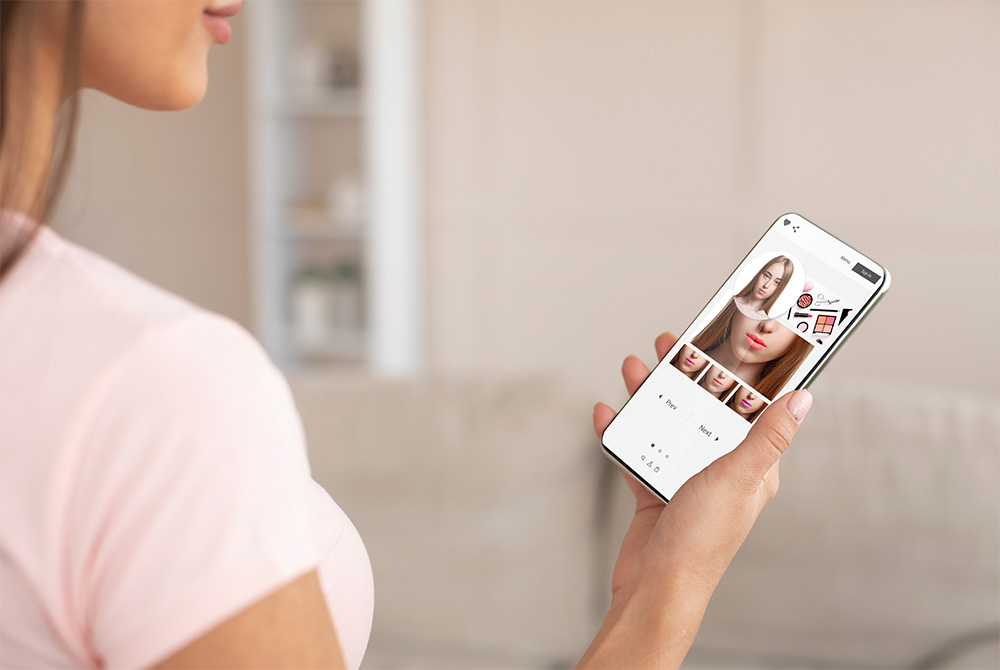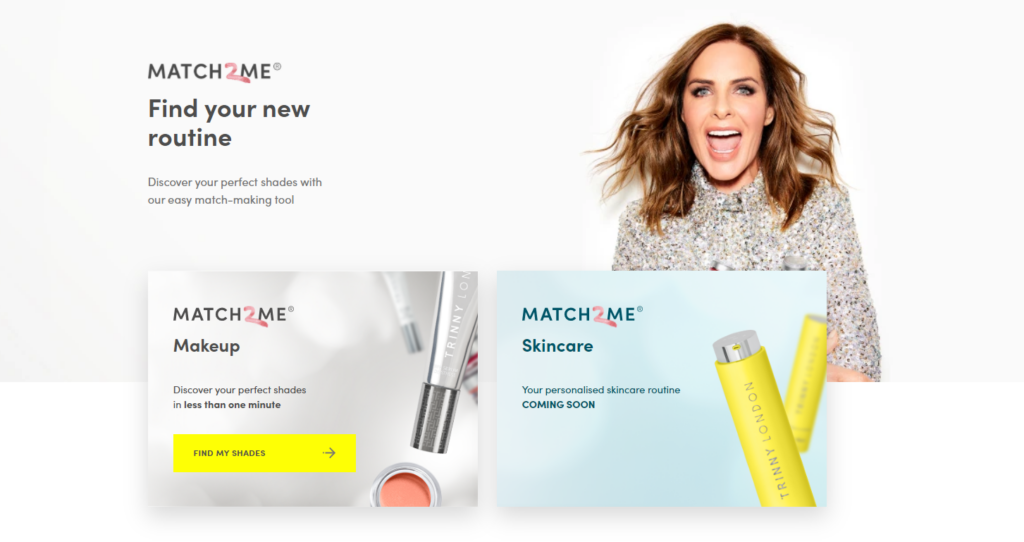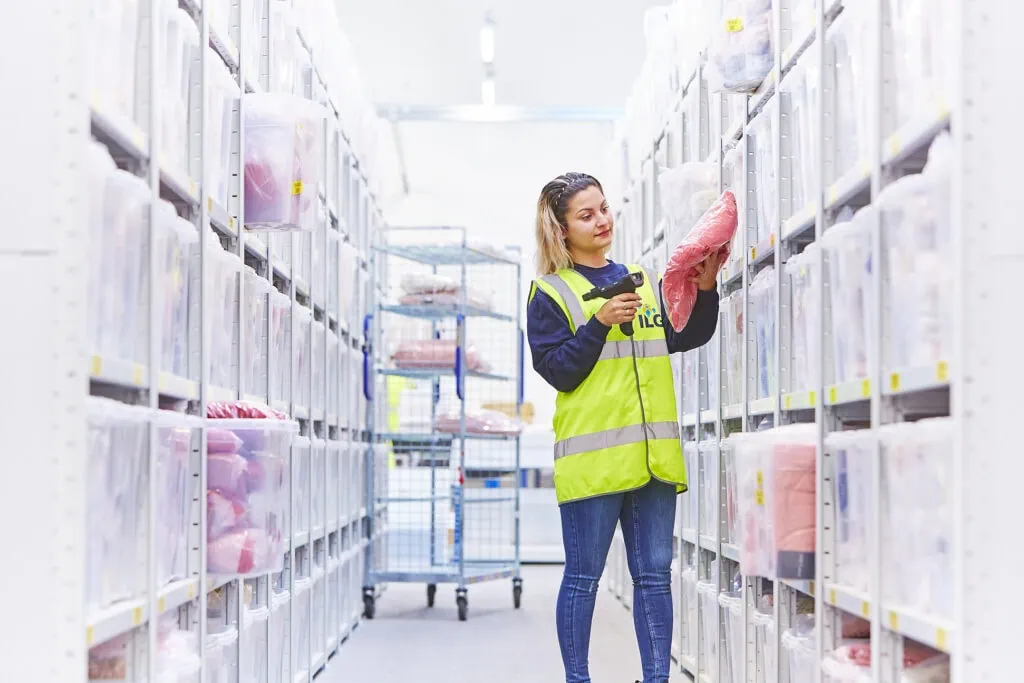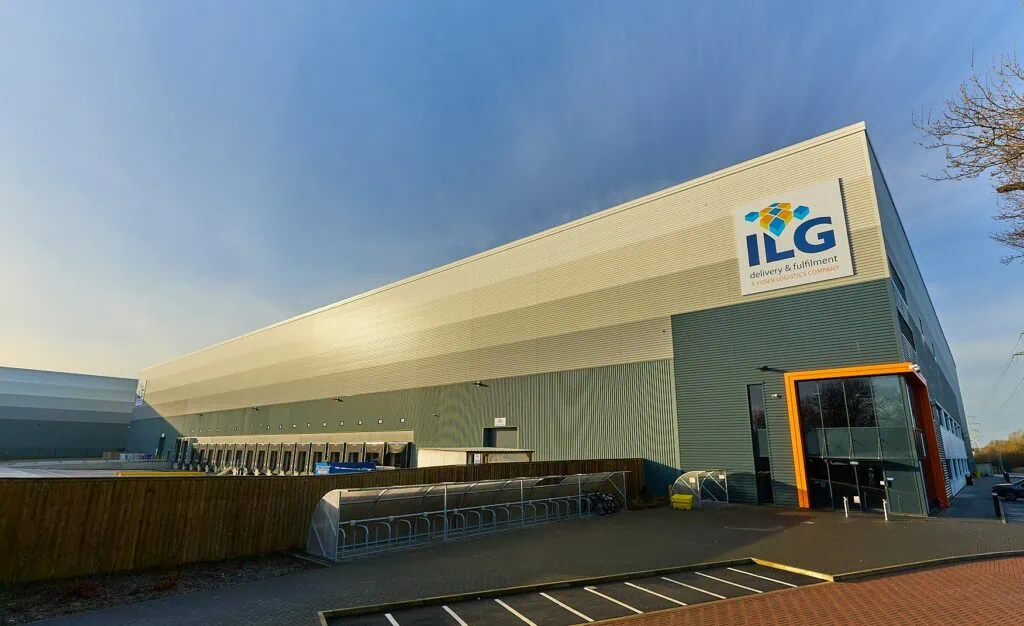
A doubling in online conversion rates. A sharp increase in customer loyalty. Triple-digit growth in turnover. Figures reported by brands like e.l.f., Estée Lauder, and Trinny London hint at something extraordinary happening to the beauty marketing industry.
In the words of Jacqui Owens, Head of Beauty at Google UKI, there has been “a seismic shift to online purchases and exploration”. Hardly surprising perhaps, given the lockdowns of 2020 and 2021, but there is more to it than mere availability.
By embracing the new technologies of artificial intelligence (AI), augmented reality (AR), and virtual reality (VR), beauty brands are bringing the personal experience of shopping in-store authentically into the digital realm – and customers love it.
Here we look at some of the stand-out examples of beauty brands embracing AI, AR, and VR within their marketing and consider how the technology might evolve in the coming years.
Discover our fulfilment services for beauty brands >
Virtual Try Ons Enhance the Beauty Marketing World
Phygital is the new buzzword for anything that bridges the gap between the physical and digital world. For beauty brands, the future is phygital. Apps that apply make-up virtually to your face have been available for a while now, but AI has brought a level of realism that is changing the beauty marketing game. Trinny London pioneered this with its innovative and award-winning Match2Me service, which highlights the perfect shades for each user’s unique combination of skin, hair, and eye colours.


Other brands have followed suit. No7, for example, launched its Foundation Shade Finder, which uses AI to analyse a customer’s skin tone in real-time, matching it against millions of samples to provide them with their personal No7 foundation shade. AR then comes into play to enable customers to “try on” various options virtually and instantly.
Where this technology scores against older make-up apps are in the accuracy achievable from the vast volumes of data that can be processed by AI. Customers feel confident in the authenticity of the results.
Build Brand Loyalty With AI Beauty Marketing
Consumer confidence is crucial in building brand loyalty and the authenticity offered by AI contributes significantly to that. Virtual try-on technology offers the opportunity to go further in building customer relationships. Trinny London again broke new ground in 2020 by launching its Virtual Appointments. Responding to the constraints of lockdown, the brand offered customers one-to-one online sessions with its make-up artists.
“These have proved to be hugely popular with customers, who have valued the engagement, the education, and ultimately the conversion to online,” said Mark McGuinness-Smith, Trinny London’s Chief Operations Officer. He added that the initiative was also popular with make-up artists, as it meant they could continue to work during lockdown.
“Technology allows us to engage with people in ways we couldn’t previously,” said McGuinness-Smith, referring to the effect that the company’s digital initiatives have had on customer relationships. Communicating and interacting via multiple digital platforms is exactly what the new generation of consumers, the Millennials and Gen Zs, are used to and expect. According to PowerReviews, 52% of Millennials and 63% of Gen Z use social media to discover new products.
Brands are enjoying success from launches and trials now taking place on the “digital shelf”, supported by omnichannel digital messaging. This allows customers to spend more time interacting with a brand, building that relationship and ultimately leading to more positive shopping experiences.
Combining Convenience With Personal Experience
The convenience of online is being reinforced by AI and AR to bring the personal experience of shopping in-store to the digital realm. Brands are creating a digital “metaverse”, a three-dimensional online environment into which customers can immerse themselves for a while.
Charlotte Tilbury Virtual Store
Before Christmas, digital-first beauty brand Charlotte Tilbury blazed the trail with its Shop with Friends function, a virtual, 3D Beauty Gifting Wonderland where customers can meet in real-time from wherever they are and shop together. Friends can try on make-up and chat, guided by stylists and influencers as they explore the virtual store.
In the words of Charlotte Tilbury herself, “It combines all the sparkle and retail theatre of our stores with the ease and portability of the digital universe to unveil a truly immersive Charlotte Tilbury experience.”
Shop with Friends is part of the brand’s virtual reality shop, which launched a year earlier. According to Chief Growth and Technology Officer Corinne Suchy, “By launching this new feature within our virtual store, we are truly operating as an omnichannel business to bring our customers rich and immersive experiences whenever and wherever they meet the brand.”
Computer Generated Influencers
The role of influencers in consumer marketing is big and set to get bigger, as technology gives brands more control over their brand ambassadors. Until now, there has been some wariness over the use of influencers in the beauty market, due to cost and reliability. This might explain why figures from Brand Equity show that only 34.1% of beauty industry advertising budgets went on digital advertising, compared to 53.1% for the market in general.
But now brands are building their own computer-generated influencers – avatars that are perfect in every way. Their cost is controllable, they always turn up, they always say the right things, they always look fabulous, and they’re never photographed falling out of a club at six o’clock in the morning!
The virtual influencer is symbolic of the power of digital beauty marketing. More than 50 appeared on social media in the 18 months to June 2020 and today there are over 150 plying their trade, according to virtualhumans.org, which documents the virtual influencer industry. But, rather than paying independent companies to have their virtual influencers promote their products, brands are taking to creating their own.
Charlotte Tilbury’s VR shop features a Magic Charlotte avatar. Prada created Candy to promote its perfume of the same name. More beauty brands are expected to launch their avatars this year. For Gen Z consumers, buying into a computer-generated role model is second nature and as the technology grows increasingly sophisticated, it will soon be difficult to tell the difference between an avatar and a real human being.
AI Assists Beauty Brands With Sustainability
A by-product of this immersive, interactive, virtual, physical metaverse is that it helps brands to meet sustainability goals. With customers able to try before they buy in a very real online setting, there is less speculative purchasing, fewer returns, less waste, and less energy consumed down the supply chain. Such issues are becoming increasingly influential in consumer choice. If brands can show that they’re not just keeping their customers beautiful but keeping the environment beautiful too, they are more like to gain customer approval and loyalty.
Growth of Online Beauty Marketing
The “seismic shift” to online over the last two years has resulted in a 40% increase in online beauty sales globally. Contrast this with the 8% fall in overall cosmetics sales over the same period. The theory that social isolation is not good for beauty products has been challenged by the performance of the online beauty market, which has bucked the trend in spectacular style.
The pandemic saw e-commerce capture a growing share of the Beauty market – up to 22% from 14% in 2019, according to the L’Oreal 2020 Annual Report – and its digital technology that is driving the trend. Innovations that were launched out of necessity at a time of social isolation have established a firm foothold and are now setting the strategic agenda for Beauty sales into the future.
Choose Us For Your Beauty Brand Order Fulfilment
ILG is proud to provide order fulfilment services for beauty brands at the forefront of these innovations, including Trinny London and Charlotte Tilbury.
Outsource to ILG and make your beauty product fulfilment more customer-oriented, streamlined and cost-effective. With bespoke facilities, industry-best tech, and expertly trained people, we fulfill e-commerce and retail orders for leading and challenger beauty brands.
Contact Us
More insights >
How to Manage Your Stock with SKU Numbers: Best Practice Guide
If you’re an e-commerce business, efficient inventory management is essential – and one important part of this is understanding SKU numbers.
ILG is a Finalist for Best Logistics Solution at the BeautyMatter 2025 Awards!
We’re thrilled to announce that for the third year in a row, ILG is a finalist for ‘Best Logistics Solution’ at the BeautyMatter 2025 Awards!

